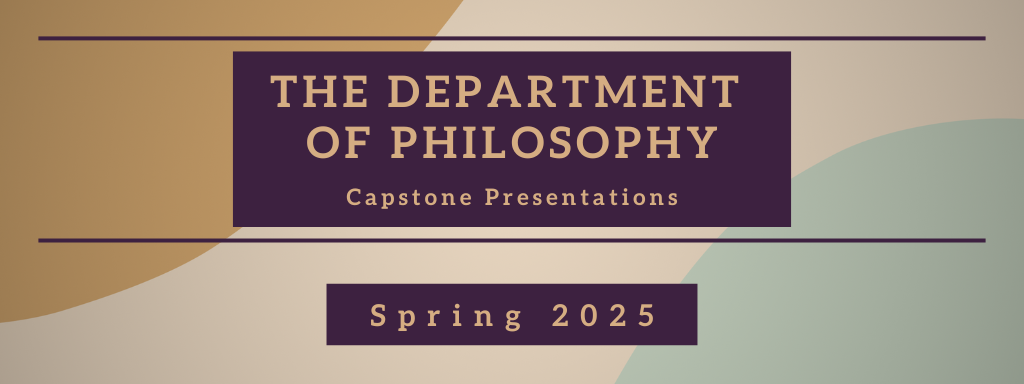
The Department of Philosophy is pleased to present the Spring 2025 Capstones.
May 15, 2025 – Xavier Hall, Room 250 – 6:00-8:00 pm
Click on each student name to see their presentation title and abstract.
Boredom and Consumer Capitalism: The Continuous Cycle and How to Become a Conscious Participant
Abstract: The current state of consumer capitalism causes those in it to be stuck in a cycle that creates and utilizes boredom to promote dissatisfaction in life and increase consumption. From the beginning of the Industrial Revolution and on, there has been a noticeable trend of alienation caused by the system, as first notably diagnosed by Karl Marx. This alienation isolates people from themselves, their work, others, and their entire essence of being. Innovations in technology and the continued development of capitalism have led to new forms of labor such as the intellectual labor that came with the spread of big corporations and managerial companies and the emotional labor that exists with the current prevalence of the service industry and the emphasis on personable businesses. With these different forms of labor and the increased permeation of alienation, boredom has become a phenomenon in people’s lives that is used as a method of manipulation within the consumer capitalist system. This system exists as a cycle, convincing people through advertisements and subliminal messaging that they desire unsatisfying things that ultimately lead to increased boredom. That boredom is taught to be something undesirable to run away from, which leads people to flee to consumption. This cycle is largely unrecognized as it is meant to be delusory, and it leads to a perceived lack of satisfaction and meaning in life. In order to become conscious of this process, I argue that one must be able to recognize that they are in this existing cycle and learn how to embrace boredom rather than run from it. This will result in a more intentional participation in the consumer capitalist cycle, reducing alienation and leading to a more meaningful life experience.
The Phenomenology of Abstract Moral Engagement: How Alienation Undermines Moral Confidence in the Context of Animal Ethics
Abstract: In this presentation, I offer a phenomenological account of the tension that arises when intellectual conviction confronts radical self-doubt, framed within the context of animal ethics. I focus primarily on a contrast between two moral experiences: that of the Walton family in the 1970s television series The Waltons and the fictional novelist Elizabeth Costello in J.M. Coetzee’s The Lives of Animals. While the Waltons make decisions based on their direct, lived encounters with animals in their immediate environment, Costello, distanced from such experiences, is caught in a cycle of intellectualizing and self-doubt, unable to reconcile her moral convictions with her distance from the lived experience of those affected. By contrasting these and similar experiences, I argue that intimate familiarity with the beings and systems impacted by one’s ethical decisions can help mitigate self-doubt, while estrangement from these realities contributes to moral paralysis experienced by individuals such as Costello. The question I wish to address, therefore, is not: Do my actions align with what I believe to be moral? but rather: How do I even know to trust my convictions in the first place? I want to convince my viewers that the second question is to be taken seriously, and that a legitimate tension arises from the translocation of ordinary intuition into the context of abstracted, alienated society.
Beyond the Mind and Through the Body: Exploring the Self Through the Mind-Body Connection and Somaesthetic Experience
Abstract: The mind-body connection has been debated throughout the history of philosophy. The mind and body cannot exist without the other, and it is a relationship of necessity. I will go through how the mind cannot exist without the body’s interaction and experience with the world, and the body cannot make sense of the experiences it has without the mind. The body is an integral part of understanding ourselves and the world around us, and Richard Shusterman brings out the idea of somaesthetics, which focuses on the body and the active cultivation of self-improvement. He uses Maurice Merleau-Ponty’s philosophy of the body as a starting point, but has disagreements with the role the body takes in life. I will go through Shusterman’s understanding of the history of the mind-body connection, his critique of Merleau-Ponty, and where he goes wrong. Continuously, I will explain the role of the body and its experiences, how movement can be an investigation into self-knowledge, and the relationship between mental representations and the mind and body.
Madness, Machines, and the Market: A Genealogy of Modern Mental Health
Abstract: We talk a lot in our society about mental health — the idea of taking care of ourselves, putting ourselves first, embracing the idea that it’s “okay not to be okay.” Where does the term mental health come from, and what does that mean? Is this new? The idea of the mind and all that goes with it is not a new concept, it’s been around since the Middle Ages, just in different forms. From mentally ill people being excluded from a disciplined society, to the subjecting of patients to being observed for their illnesses, to the permissivity of being the best version of yourself (and responsibilizing that it is your fault if you can’t achieve it), we arrive at mental health. We’re here to dissect this: from the history of this idea of the “mental” — whether it be mental hygiene, illnesses, or health — to the society we’re in now.



Social Media